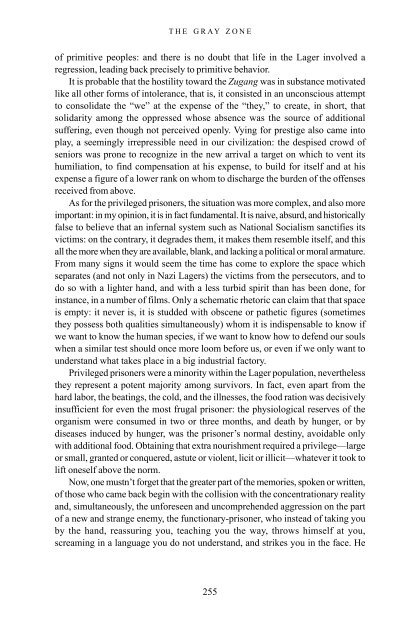The_Holokaust_-_origins,_implementation,_aftermath
The_Holokaust_-_origins,_implementation,_aftermath
The_Holokaust_-_origins,_implementation,_aftermath
Create successful ePaper yourself
Turn your PDF publications into a flip-book with our unique Google optimized e-Paper software.
THE GRAY ZONE<br />
of primitive peoples: and there is no doubt that life in the Lager involved a<br />
regression, leading back precisely to primitive behavior.<br />
It is probable that the hostility toward the Zugang was in substance motivated<br />
like all other forms of intolerance, that is, it consisted in an unconscious attempt<br />
to consolidate the “we” at the expense of the “they,” to create, in short, that<br />
solidarity among the oppressed whose absence was the source of additional<br />
suffering, even though not perceived openly. Vying for prestige also came into<br />
play, a seemingly irrepressible need in our civilization: the despised crowd of<br />
seniors was prone to recognize in the new arrival a target on which to vent its<br />
humiliation, to find compensation at his expense, to build for itself and at his<br />
expense a figure of a lower rank on whom to discharge the burden of the offenses<br />
received from above.<br />
As for the privileged prisoners, the situation was more complex, and also more<br />
important: in my opinion, it is in fact fundamental. It is naive, absurd, and historically<br />
false to believe that an infernal system such as National Socialism sanctifies its<br />
victims: on the contrary, it degrades them, it makes them resemble itself, and this<br />
all the more when they are available, blank, and lacking a political or moral armature.<br />
From many signs it would seem the time has come to explore the space which<br />
separates (and not only in Nazi Lagers) the victims from the persecutors, and to<br />
do so with a lighter hand, and with a less turbid spirit than has been done, for<br />
instance, in a number of films. Only a schematic rhetoric can claim that that space<br />
is empty: it never is, it is studded with obscene or pathetic figures (sometimes<br />
they possess both qualities simultaneously) whom it is indispensable to know if<br />
we want to know the human species, if we want to know how to defend our souls<br />
when a similar test should once more loom before us, or even if we only want to<br />
understand what takes place in a big industrial factory.<br />
Privileged prisoners were a minority within the Lager population, nevertheless<br />
they represent a potent majority among survivors. In fact, even apart from the<br />
hard labor, the beatings, the cold, and the illnesses, the food ration was decisively<br />
insufficient for even the most frugal prisoner: the physiological reserves of the<br />
organism were consumed in two or three months, and death by hunger, or by<br />
diseases induced by hunger, was the prisoner’s normal destiny, avoidable only<br />
with additional food. Obtaining that extra nourishment required a privilege—large<br />
or small, granted or conquered, astute or violent, licit or illicit—whatever it took to<br />
lift oneself above the norm.<br />
Now, one mustn’t forget that the greater part of the memories, spoken or written,<br />
of those who came back begin with the collision with the concentrationary reality<br />
and, simultaneously, the unforeseen and uncomprehended aggression on the part<br />
of a new and strange enemy, the functionary-prisoner, who instead of taking you<br />
by the hand, reassuring you, teaching you the way, throws himself at you,<br />
screaming in a language you do not understand, and strikes you in the face. He<br />
255



